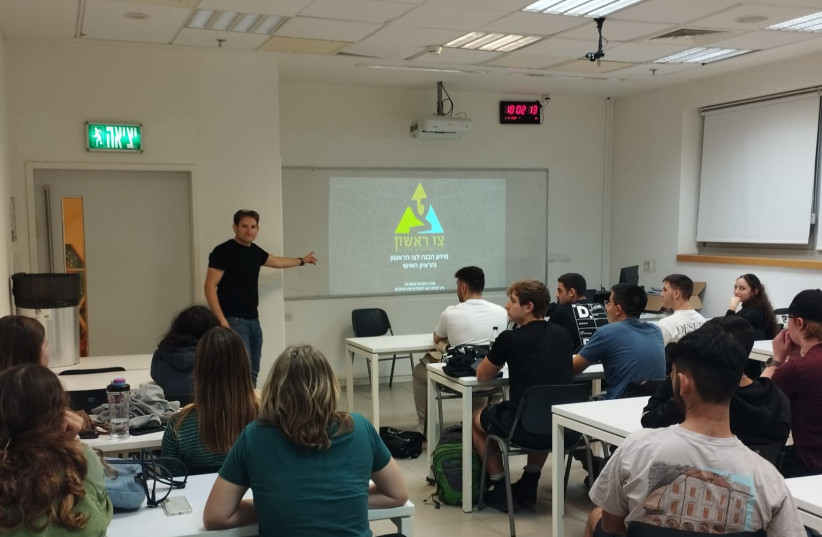More than 2,300 students from both the southern and northern regions of Israel have demonstrated their unwavering commitment to education by enrolling in the Nitzanim program, offered by the Be'Netivey Udi NGO.
This innovative educational initiative, which provides high-quality tech training, has recently expanded to include an additional 100 students from communities such as Ofakim, Netivot, Ashkelon, and others near Gaza.
Founded in 2016 by the NGO Be'Netivei Udi, along with Maj. Gen. Uzi Moskovitz, the program's mission is to train youth from the South for positions in the IDF's computer and information techology professions. Over 50% of the program's graduates are integrated into technological roles in the army.
Be'Netivey Udi, established by Mordechai and Georgette Elgrably in memory of their son, Lt. Udi Elgrably, who served in the Paratroopers Brigade and fell in battle in Lebanon in 1994, is dedicated to bridging social divides and championing the values and mission of their son.
The expansion of Nitzanim aims to address the shortage of math and computer science teachers in these areas, bolstering educational opportunities for the youth.

The Swords of Iron War has had a significant impact on the education system, resulting in the loss of numerous school days.
Schools have only recently begun to resume their routines, with students in southern and northern regions experiencing disruptions to their education, compounded by a shortage of teachers in crucial subjects such as mathematics, English, and computer science. However, over 2,300 young students from the southern, northern, and evacuation center regions, including Eilat and Jerusalem, have chosen to take matters into their own hands.
Taking matters into their own hands
They have embarked on programming studies outside regular school hours through the Nitzanim program, refusing to allow the challenges of war to derail their futures.
Nitzanim offers free programming courses to disadvantaged youth aged 15-18, with the goal of preparing them for roles in the IDF's technological units and, ultimately, the hgih-tech sector.
Lt. Col. Korin Cohen Matok, the manager of Nitzanim, who is currently in reserves at the Southern Command, emphasized the urgent need for additional support to cater to a broader student population.
"Mayors, especially from the south, express concerns about students not learning adequately, potentially jeopardizing their future," stated Matok. "In response, the Nitzanim program has expanded to accomodate more students."
Approximately 100 additional students from the southern region have joined the program amid the challenging circumstances. Evacuated students continue their studies via online platforms like Zoom, while in-person classes are conducted in Eilat.
Mayor Itzik Danino of Ofakim expressed his support, saying, "This devastating war inflicts immense trauma, and the perseverance of the children in pursuing the study of programming, a skill that can open numerous doors in both military service and career opportunities, establishes a constructive routine and imbues their lives with meaning. To foster the development and resilience of the south, our primary commitment lies in fortifying our children and safeguarding their futures."
Parents also share concerns about the impact of the war on their children's future careers. Liraz Golan, a mother from Ofakim, remarked, "It's not just about the children missing out on learning; they're traumatized. Three years ago, they were in quarantine, worried about health. Today, the arrival of war in our city added further complexity to this situation, making their educational journey even more challenging."
Reut Savistri, a 12th-grade student from Zikim, echoed the sentiment, stating, "Similar to the confusion during the pandemic, the current situation in unclear, and sometimes I fear for my future. Still, I enrolled in Nitzanim because it's essential to me to contribute to the south's economic and security development, introducing high-tech and defense industries. I want to be just a part of the future, but a part of a better future. Especially during wartime, I recognize the importance of persisting in programming studies, and I'm grateful to continue pursuing these dreams."
Recognizing the importance of continuous education, especially in high-tech fields, is crucial to securing the future of southern children and evacuees.
The ongoing war exacerbates existing inequalities between disadvantaged communities and wealthier ones, posing a significant threat to the younger generation in the south and north. The Nitzanim program is determined to prevent this potential loss through its tireless efforts.
The program collaborates with the IDF's Computer Service Directorate, the Education Ministry, Israel National Digital Agency, UJA-Federation of New York, The Phoenix Insurance COmpany, Shahua Family Foundation, and others.
